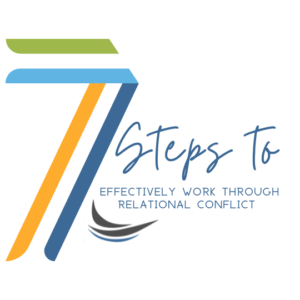 Relational problems associated with family upbringing or one’s primary support group are common stressors that come up in therapy, especially for those seeking strategies and support around conflict-resolution.
Relational problems associated with family upbringing or one’s primary support group are common stressors that come up in therapy, especially for those seeking strategies and support around conflict-resolution.
Problems within the parent-child relationship, sibling, or intimate partner relationships often involve arguments which may lead to threats of verbal or physical aggression. Additional conflicts can arise from a high level of expressed criticism, hostility, or emotional overinvolvement. These problems can significantly impact not only the development of mental health symptoms but also the prognosis and course of pre-existing mental health concerns.
When it comes to conflict resolutions, here are some ways to help effectively work through relational conflict.
1. Focus on the Problem, not the Person
This is important but often underestimated key point. What is really the problem? Let’s focus on that.
2. Listen to Understand Using Empathic Listening
Hear out the other’s perspective without interrupting and check for understanding. It can be difficult to remain calm and patient, especially when you may not agree with the content of the conversation.
3. Learn to Regulate Your Own Emotions
It is difficult to think clearly when one is dysregulated. If you are feeling triggered during a conflict, it helps to take a few deep breaths or find other coping strategies to help calm down.
4. Know When to Take a Break
No conflict is going to end well when emotions are heightened. Diffuse situations that could escalate to verbal or physical altercations by temporarily removing yourself from the situation.
5. Learn Effective Communication Skills
Use of I-Statements and the acronym DEARMAN is a great foundation for interpersonal effectiveness skills. It can offer a model to help one be respectful, yet assertive in communicating needs, emotions, and boundaries.
6. Learn How to Apologize
Take responsibility for your own role in conflicts rather than assigning blame and offer a proper apology. Be sincere.
7. Learn to Accept Differences.
We are going to disagree with others. Disagreement is normal and unavoidable. Be willing to compromise for a win-win or agree to disagree. Consider seeking professional help if you are still struggling.
We’re Here to help
Our wellness experts will be happy to take care of you. You can CLICK HERE to schedule an appointment now or call (612)223-8898.
Meet Clinicians
We’re united by our commitment to providing effective, relevant, and innovative mental health support at all stages of your journey. Click Here to find out more about who we are, where we come from, and how we live out CARE’s mission every day.
The professionals at CARE are actively collecting and creating resources to help with what you need. We’re Here for You.



